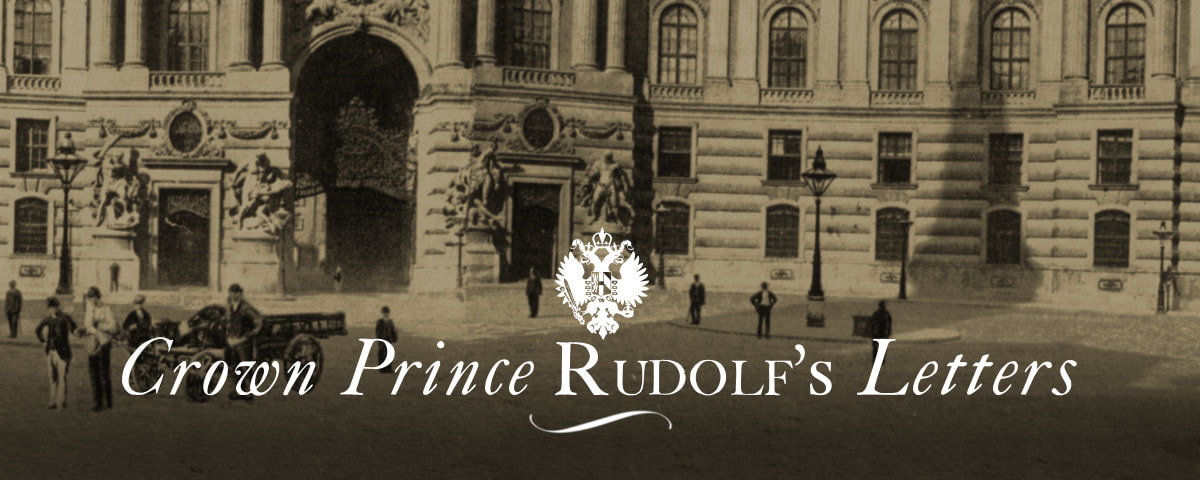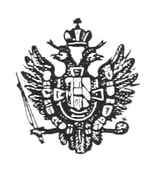Arbeiter Zeitung
October 1 and 3, 1922
trans. in The Living Age
November 25, 1922
|
NOTE |
RUDOLF OF AUSTRIA (1858-1889), also spelled Rudolph, was the crown prince of Austria and heir to the thrones of Austria and Hungary. He committed suicide in 1889, sparking more than a century of conspiracy theories about his death. The publication of a selection of his letters to his friend and journalistic mentor Moritz Szeps in 1922 helped to provide greater insight into his character and thinking. Never translated into English, some excerpts that had run in the Arbeiter Zeitung newspaper were translated into English and published in The Living Age.
|
CROWN PRINCE RUDOLPH’S LETTERS
|
[Crown Prince Rudolph, the only son of Emperor Francis Joseph, whose mysterious and violent death in 1889 has never been satisfactorily explained, left little if any impression on the political events of his time. His recently published letters to a friend have, however, aroused some speculation from those curious in such subjects, as to what might have been the fate of Europe if this liberal prince and Emperor Frederick III of Germany had lived to reign as long as their fathers did.]
From Arbeiter Zeitung, October 1, 3
(VIENNA CONSERVATIVE SOCIALIST DAILY) |
There are still a few fantastic people who even now imagine that the old moribund, decayed Austro-Hungarian monarchy really had a mission in the world. They torment themselves with barren speculations on what might have been if . . . We warmly recommend to these people Crown Prince Rudolph’s political letters. They were addressed to his friend, the elder Szeps, editor-in-chief of the Wiener Tagblatt, an influential and well-known journalist of the 80’s and 90’s.
This correspondence gives us, for the first time, a clear impression of Crown Prince, who has hitherto been a vague figure enveloped in the mist of legend. He certainly was an unexpected and unique character; a liberal, anticlerical, antinobility Hapsburg, a man who thought and spoke like a Simon-pure Liberal of the late lamented United Left. The passages that relate to public affairs at home read like quotations from Szeps’s own editorials; and the articles that the Crown Prince published anonymously in the Tagblatt betray, in both content and style, fair journalistic talent — obviously trained under the direction of the elder Szeps, and mimicking his peculiarities.
Referring to the notorious amendment to the school laws adopted in 1883, Rudolph writes: --
This correspondence gives us, for the first time, a clear impression of Crown Prince, who has hitherto been a vague figure enveloped in the mist of legend. He certainly was an unexpected and unique character; a liberal, anticlerical, antinobility Hapsburg, a man who thought and spoke like a Simon-pure Liberal of the late lamented United Left. The passages that relate to public affairs at home read like quotations from Szeps’s own editorials; and the articles that the Crown Prince published anonymously in the Tagblatt betray, in both content and style, fair journalistic talent — obviously trained under the direction of the elder Szeps, and mimicking his peculiarities.
Referring to the notorious amendment to the school laws adopted in 1883, Rudolph writes: --
This step backwards, this debasing act! How our proud, liberal, and progressive Austria has changed in a few years! These are sad times, and what has just occurred is merely the first step on the road to reaction. We are going back to the Concordat!
Again, Rudolph congratulates Szeps on his fiftieth birthday as follows: --
Moreover I wish you, as a public man, as a true Austrian, many years of unimpaired vigor, to stand as a courageous warrior in the front ranks, fighting for the principles of true enlightenment, true culture, humanity, and liberal progress. We are closely akin in ideals and opinions. We are striving toward the same goal.
In fact that was the real Austrian liberalism of those days, with its weakness for fine phrases, its blindness to the realities of life. But the Crown Prince was prudent in his opposition to the Clericals. He published a pamphlet against spiritualism, but insisted that his authorship should be kept a strict secret, because he wrote things ‘that would not please the adherents and protagonists of positive religion, of whom we have many influential and energetic examples among us.” Rudolph hated Taaffe — at that time Premier – and still more the feudal Bohemian nobility. In a contribution which he sent Szeps for his paper, he is not unwittily sarcastic at the expense of certain young noblemen of high rank, who indulged by way of an evening entertainment, in smashing in the windows of a Jew’s house in Prague. They were arrested for the offense, but immediately released with many polite apologies. In a note accompanying this article, the Crown Prince says, ‘If a poor working lad were to smash a Jew’s window there would be a great furore about it, but these feudal gentry are not to be disturbed in their amusements.’
Crown Prince Rudolph was unmeasured in his condemnation of Taaffe and his futile Cabinet.
Crown Prince Rudolph was unmeasured in his condemnation of Taaffe and his futile Cabinet.
We live in evil days; financial swindles, theft, rogues in high places, arbitrary government, arbitrary suspension of constitutional rights, corruption, political degeneracy - that is, in a few words, my idea of the present state of affairs. I am curious, merely as a quiet observer, to see how long an old, solid structure like Austria will take to begin to crack at every joint and tumble in ruins. . . . The present Cabinet seems more securely in the saddle than ever. We must concede that Count Taaffe has a tapeworm tenacity of life.
Taaffe was, for the Crown Prince, merely a tool of the oligarchy that was fighting modern culture and opposing bitterly the solid phalanx of the educated middle classes; in this struggle he appealed to ‘influences which it will be impossible to exclude from public life later.’ Here the Crown Prince refers to the intrigues of the aristocratic leaders, especially the two Princes Lichtenstein, the first of whom was the leader of the Clericals in the House of Nobles, and the second one of the founders of the Christian Socialist party. It was the latter who conspired with the editor-in-chief of the clerical organ Das Vaterland, the well known Baron Vogelsang, to incite certain anarchists and labor groups to armed insurrection.
The Crown Prince refers to this plot in a letter dated February 15, 1884: --
The Crown Prince refers to this plot in a letter dated February 15, 1884: --
To-day Krticzka, Chief of the Police Department, called on me and was remarkably talkative. . . . You will be amused at something I have discovered, something concerning the Lichtensteins. The secret meeting was held at Schneider’s in the Wahring. Baron Vogelsang presented his Socialist acquaintance to the two Princes. It was there that the famous pamphlet was concocted. The Princes had to pay a good sum to their emissary, the Radical labor leader, Strotz, who was to make a tour of the factories in their behalf, learn the condition of the working people, and excite them against their employers and the Government.
The Socialists are making all sorts of fun of these noble patriots and their schemes, but manage to squeeze a lot of money out of them. Strotz, who belongs to the extreme Radicals in the Labor Party, has absconded. When the Princes learned this, one of them created a scene with the Chief of Police in the lobby of the Lower House. The other posted off to police headquarters to intercede for his friend, but accomplished nothing. When I asked what the efficient and energetic police department was going to do with Prince Alois Lichtenstein, Krticzka answered, ‘Well, we have not got enough evidence to prove anything; he has certainly been exciting anarchists. If he were not a prince we’d pull him, and have him up before the magistrate, and have him warned; but naturally we cannot do that under the circumstances.’ Sancta simplicitas! That was all the brave fellow could say.
The Crown Prince then relates how he impressed upon the Chief of Police in most unambiguous terms what he thought of the whole present system, and describes how he enjoyed the embarrassed look of the good man, who did not dare to say either yes or no. In this instance, however, the Crown Prince was unjust. How else could poor Krticzka treat a Crown Prince?
Rudolph describes in a previous letter a conversation with Tisza about the anti-Semite persecutions instigated by Austrian aristocrats in Hungary, adding:
Rudolph describes in a previous letter a conversation with Tisza about the anti-Semite persecutions instigated by Austrian aristocrats in Hungary, adding:
The Emperor apologized for the fact that these gentlemen had gone down to Hungary; adding in an irritated tone, that ‘no one could bring a Schwarzenberg or a Lichtenstein to his senses,’ or venture to order him about.
However, the most remarkable passages in Rudolph’s letters are those relating to Germany. A lying legend of the Hapsburgs has it that the Crown Prince was a devoted champion of the German alliance and a warm friend of Emperor William. We learn here from his own pen that he was an enemy and a hater of Germany, as all the Hapsburgs were at heart. His abhorrence of that country sprang from several grounds. Like most of the Austrian Liberals of the old school, he was an admirer of France.
I am a friend of the French, and have a deep affection for their country. We are enormously indebted to France as the fountain-head of all the liberal ideals and institutions of our continent, and in every supreme crisis, when great thoughts begin to manifest themselves in acts, she is our example and leader. What is Germany, however, except an overgrown Prussian soldateska and a purely military State? How did Germany utilize the year 1870? Merely to add a Kaiser to her host of petty kings and princelets! She has to pay for a much larger army than before; and visions of unity and empire — fostered and drilled into the people by soldiers, policemen and rigid bureaucrats, and supported by partly spontaneous, partly incalculated patriotism — hover before the points of her bayonets.
But the contempt that the Crown Prince shows for German unity is ridiculously inconsistent with his attitude toward Austrian unity. Himself a zealous soldier, he longs to draw a sword for Bosnia, and believes the unity of the Hapsburg empire is a necessity ‘because the territory that we occupy cannot vanish.’ His hostility to the Germans as a people is also surprising, since in Austria itself he was an ardent champion of the Germans against the Slavs, and he recognized that the alliance with Germany strengthened the German-Austrians in their own country. Rudolph also realized that the German alliance was a guaranty of Austria’s survival. Yet he rejoices maliciously — and with remarkable prevision — when he discovers from the first speeches that William II delivered after ascending the throne, that this monarch was fated to be the destroyer of Germany. True inborn Hapsburg hatred of the Germans and genuine Hapsburg delight in the misfortunes of others ring out in the following words: --
William II is making his own destiny. He will soon cause hopeless confusion in old Europe. I feel that he is just the man for that. (Omission by the Editor.) He is energetic and self-willed. (Omission by the Editor.) Considers himself the supreme genius; what more would you have? In a few years he will put Hohenzollern Germany just where she deserves to be.
We see that the Hapsburgs were as bitter in their hatred of the Germans as Clemenceau himself. Moritz Szeps, Rudolph’s journalist-mentor, to whom these letters were written, was in fact an intimate friend of Clemenceau, and passionately attached to everything French, from l’esprit gaulois to French cooking.
Germany was probably never more devoted to peace than during the last years of the Bismarck régime. None the less, Rudolph was constantly attributing to Bismarck secret designs to attack by surprise Germany or Russia.
Germany was probably never more devoted to peace than during the last years of the Bismarck régime. None the less, Rudolph was constantly attributing to Bismarck secret designs to attack by surprise Germany or Russia.
I long thought Bismarck an honorable man. Now I am deeply suspicious, and have been for some time, of Berlin. I have reasons for this. Why are they encouraging the Conservative parties here? Why are they so glad that we are drifting steadily toward absolutism? Because they want to use Austria to attack the East.
It was not until after his Berlin visit in 1887, shortly before the death of William I, that Rudolph changed his tone:
People at Berlin want peace. The Kaiser [William I] is in a very bad way. The Crown Prince, [later Kaiser Frederick III] has one foot in the grave. Prince William is a semi-invalid, not to be taken seriously. The Government wants good relations with Russia, not from love of that country but from consciousness of its own weakness. Berlin is feeble with old age.
Rudolph’s satisfaction at finding Berlin ‘feeble with old age’ inclines him for a moment to admit that Germany really desires peace; but whenever Berlin makes a friendly overture to Austria, his suspicions are again aroused. ‘Prussia is propitiating only when she is looking for something.’ This sentence is repeated with variations over and over. At the same time Rudolph is constantly alarmed lest Russia attack Austria.
On the whole, however, the picture of the Crown Prince that we receive from these letters is a pleasant and winning one. When we recall the cold, cruel, callous court manner of his father, Francis Joseph, or the rough, despotic character of half-mad Francis Ferdinand, or Charles’s childlike moral insensibility and unpredictability, Rudolph appears by contrast as a man of fairly average gifts and education — a man who might fit usefully into some chink in the world. He had respect for the bourgeois liberalism of the time; but he had no comprehension whatsoever of the labor movement which was just then beginning to attract attention. He was marvellously free from the prejudice, self-pride, and incapacity to understand his fellow men, so universal in the aristocratic caste. For instance, he associated with Szeps on a footing of absolute equality, invited him to call often, and shared — almost as a member of the domestic circle — in the family anniversaries of his friend. To be sure it does not speak well for Rudolph’s knowledge of men that, during his seven years intimate association with Szeps, he did not discover that the latter was an unscrupulous journalist and politician. The same naive unfamiliarity with real life is indicated in his constant fear lest his letters be opened. He is almost childlike in his flattered delight because his harmless opposition to the statesmen in power caused certain conservative noblemen to refer to him as “incalculable.” Not a strong character, not a man of mark; but an engaging fellow! As a political thinker he was inconsistent and confused. He greeted the prospect of Germany’s overthrow with delighted anticipation, although he realized that Germany’s support was essential to Austria both abroad and at home. He was equally blind in his attitude toward the agitation of the different nationalities within the Austro-Hungarian empire. He persisted in regarding these movements as mere feudal intrigues, for which he knew no better remedy than brute force: --
On the whole, however, the picture of the Crown Prince that we receive from these letters is a pleasant and winning one. When we recall the cold, cruel, callous court manner of his father, Francis Joseph, or the rough, despotic character of half-mad Francis Ferdinand, or Charles’s childlike moral insensibility and unpredictability, Rudolph appears by contrast as a man of fairly average gifts and education — a man who might fit usefully into some chink in the world. He had respect for the bourgeois liberalism of the time; but he had no comprehension whatsoever of the labor movement which was just then beginning to attract attention. He was marvellously free from the prejudice, self-pride, and incapacity to understand his fellow men, so universal in the aristocratic caste. For instance, he associated with Szeps on a footing of absolute equality, invited him to call often, and shared — almost as a member of the domestic circle — in the family anniversaries of his friend. To be sure it does not speak well for Rudolph’s knowledge of men that, during his seven years intimate association with Szeps, he did not discover that the latter was an unscrupulous journalist and politician. The same naive unfamiliarity with real life is indicated in his constant fear lest his letters be opened. He is almost childlike in his flattered delight because his harmless opposition to the statesmen in power caused certain conservative noblemen to refer to him as “incalculable.” Not a strong character, not a man of mark; but an engaging fellow! As a political thinker he was inconsistent and confused. He greeted the prospect of Germany’s overthrow with delighted anticipation, although he realized that Germany’s support was essential to Austria both abroad and at home. He was equally blind in his attitude toward the agitation of the different nationalities within the Austro-Hungarian empire. He persisted in regarding these movements as mere feudal intrigues, for which he knew no better remedy than brute force: --
I am more and more coming to the conviction that in the long run the army is the ultimate protector and supporter of government and order, and that it must step in with an iron hand to rescue the bourgeoisie and constitutional government.
Source: “Crown Prince Rudolph’s Letters,” The Living Age, November 25, 1922, 465-469.




